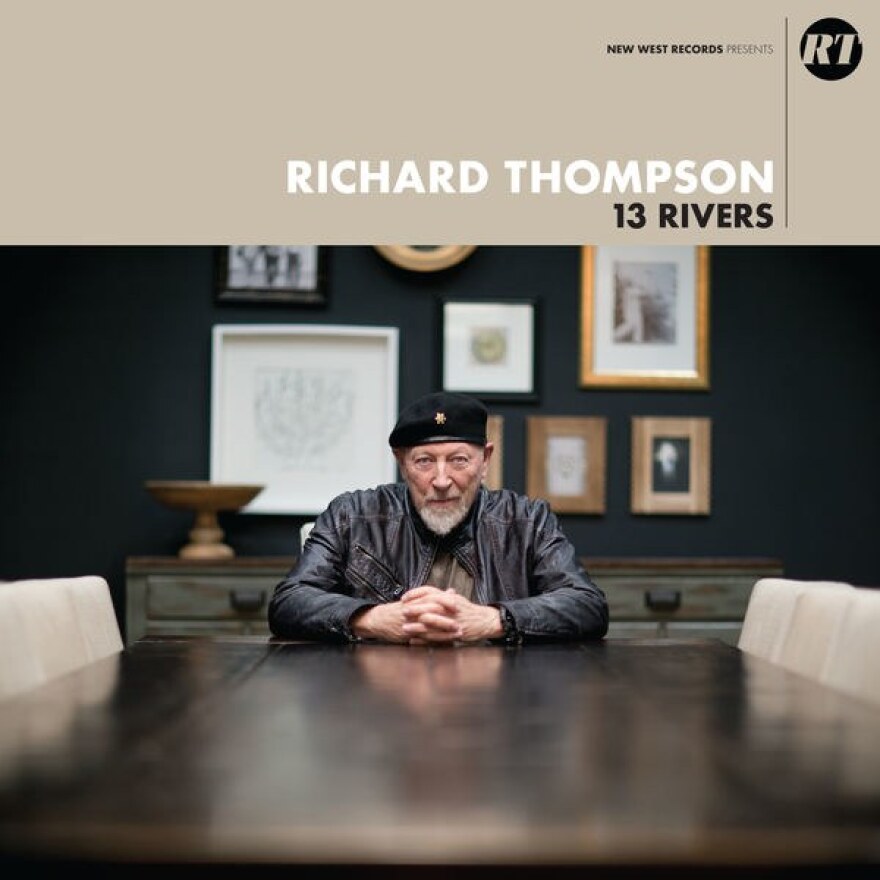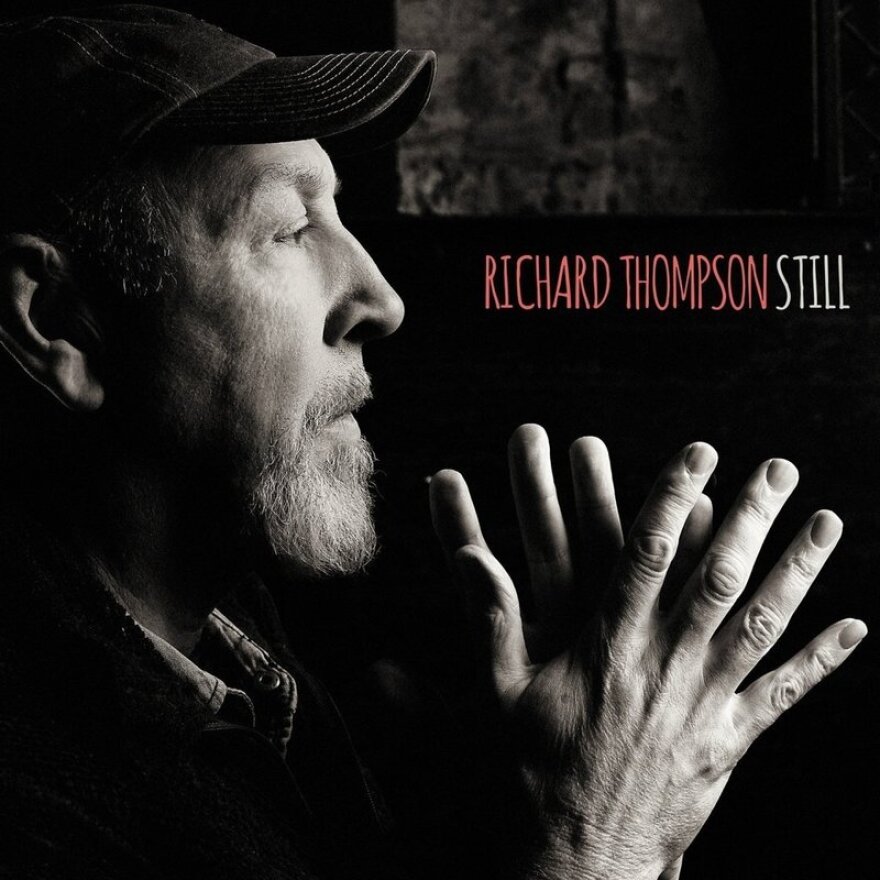British guitarist and songwriter, Richard Thompson, has been making music and records since the mid-1960s, first with Fairport Convention, a band known for merging traditional English folk songs with rock instrumentation, and then as a solo artist in 1972.

His new record 13 Rivers is his 18th solo studio album. Richard Thompson plays Wednesday, November 27, in Charlottesville at the Jefferson Theater. WMRA’s Chris Boros spoke with Thompson about his music and legacy in the world of folk and rock.
WMRA: When you’re working on a record these days like your most recent 13 Rivers, how different is the process compared to when you made your first album in 1972?
Richard Thompson: It’s not that different really. We still try to record as live as possible. In terms of technology, I still record analog. But we could probably get a bit more streamlined in the studio – we could probably get more work done in a day just because the musicians are more seasoned and we don’t waste as much time. But I’ve always tried to keep fairly to the point in the studio, it’s as businesslike as possible. The answer is things haven’t changed that much.
WMRA: Do you have all of the songs demoed and ready to go? Do you have an idea of what they’re going to sound like before recording?
RT: Yeah but I also think you have to keep an open mind and keep flexible because sometimes things change and they change for the better. But I do prepare as much as possible. I send out demos to the musicians but I do tell them not to fall in love with the demo; I do tell them it’s just a guideline. Lucky accidents happen all the time in the studio so you have to be open to that.

WMRA: So you’re still recording analog on analog tape?
RT: Oh yeah, absolutely.
WMRA: That’s incredible – I don’t think too many people are doing that?
RT: Actually they are. People sometimes just record the rhythm track on analog, they record the bass and drums and guitar on analog and then they transfer it into the digital realm. I like analog, for me it just sounds different. It sounds more cohesive – things mix together better. But then I’m a certain generation that will have a whole different experience of sound and will have a whole different way of appreciating sound who would think I was nuts.
WMRA: So what is it like when Rolling Stone Magazine calls you one of the greatest rock guitar players of all time? You don’t really see yourself like that, right?
RT: When you think about the guitar, it’s a popular instrument. It was popular when I was a teenager and there were a lot of guitar players around – I grew up in London – there were a lot of guitar players you could go and see like Eric Clapton, Jimmy Page, Jeff Beck playing sort of blues stuff. I really wanted to be something different so I’m not going to go down that road. That doesn’t necessarily mean I’m a popular guitar player, perhaps I’m a bit more idiosyncratic and a bit different from other guitar players which I see as a virtue. These Top 20 lists of guitarists are fairly stupid actually. I don’t think it’s a good idea to compare guitar players, especially when people say “is Andrés Segovia better than Jeff Beck?” It gets a bit silly, doesn’t it?

WMRA: I want to talk about when you were a teenager and you landed that first record deal with Fairport Convention in 1967. What was that like, being so young and in a touring and recording band?
RT: I think it was one of those times when the floodgates were open. The record companies were very confused by the psychedelic movement in London – they didn’t know what was going on and out of fear they just signed everybody. Anybody could get a record contract in 1967 including Fairport. We’d only really been a band with that name for about two or three months. I think that we weren’t that surprised actually. We said, “of course we got signed, of course we got a record deal.” It just seemed like a logical step to us. Maybe that’s just teenage arrogance or something but it wasn’t too much of a surprise.

WMRA: When you were young and growing up, do you remember what kind of music was played in your house as a kid?
RT: I had a big sister, she was five years older than me. So I was very influenced by whatever she was playing and coming from the bedroom wall. So there was lots of Buddy Holly – she had everything by Buddy Holly. Lots of early Rock N’ Roll – she had really cool things like Sonny Taylor and Brownie McGhee records, Lightnin Hopkins records, this is in like 1962 or something, this is very early. She had the first Bob Dylan record, this is fairly unusual stuff. And then in my dad’s record collection you had Django Reinhardt records, Les Paul records, Duke Ellington, Luis Armstrong, and I also grew up with all this Scottish dance music and that also had a strange influence on me.
WMRA: When you look back on those early years, you’re in the studio making Liege and Lief, it’s 1969, that’s a record that many people say started the British folk-rock movement. When you guys were recording that, did you know that what you were doing was going to be so special and have such an impact?

RT: I think the short answer is yes. And that time we were kind of revamping the band. We considered the idea of doing more traditional music, it had already been creeping into our repertoire. We’re going to take British traditional music - British, Irish and Scottish music – and we’re going to put it with rock music, we’re going to blend the two with the idea that this will give us more credibility and it will be something that we could excel. So we were thinking this is really something unique and something no one’s really tried before. So we were aware that this was a drastic step to take.
WMRA: Are you amazed that people still want to talk to you about a band that you haven’t been a member of since 1970?
RT: Yes. (Laughs) It’s surprising. I suppose it has something to do with the baby boom generation and here we are fifty years later still talking about it. At the time when I was 18, I’m thinking “well this is really fun and I’ll do this for six months. And then I’ll go to college and I’ll get a real job.” But we’re having fun so we’ll keep going and that lasted for two years, then five years, then ten years. I’m still looking over my shoulder with the guilty feeling that I’m having too much fun and at some point I’m going to have to go and work at a bank.

WMRA: I remember seeing an ad for Fairport in the 90s for a gig they were doing and it said “Without Richard Thompson.” And I remember thinking, he hasn’t been in the band since 1970.
RT: (Laughs) Yeah, that is a little strange. So sorry about that.
WMRA: There’s a song you wrote an album a few years ago that talks about being struck on a treadmill. And I think a lot of us feel this way, we’re walking and walking and not going anywhere. But I can’t imagine that you, Richard Thompson, ever feel like this when you’re making records and constantly reinventing yourself all the time, but do you?
RT: No, I don’t feel like I’m on a treadmill. That song is a sympathetic song about people who are really stuck in a job and they don’t have many options. But I think there are a lot of people who really feel like that, hand to mouth, you don’t really know if you’re ever going to get above water sometimes in terms of debt, things like that. So I think life can appear to be a treadmill but I don’t see that in my life, no.

WMRA: Do you ever go on YouTube and type in Richard Thompson? You can spend hours looking at all these different videos. What is that like for you to have a resource where you can see stuff when you’re 18 years old and it’s 1970? You can kind of go back and look at all of this old material. Is that weird?
RT: Yeah, it’s really weird, surprisingly weird. (Laughs) And I’m thinking about kids who are 18 now having so much more of everything. Because now everything is photographed and filmed. How much footage is there of Height Asbury in 1967? There’s like none. So it’s nice that we have records. You can have a Nick Drake record from 1969 that actually shows you this extraordinary genius. And if we didn’t have recordings than it would be just totally lost to the world.
WMRA: When someone’s listening to a Richard Thompson song or album, what do you hope they wake away from it?
RT: Probably emotion more than anything else. You write something and you play something that’s true to you then it will be true to everybody - to have a universal appeal and if you have that then other people can share it. One of the nicest things is when people say “I really get that song.” And you say “Wow. Fantastic. That actually communicated.” I love the idea that music comes from my heart to someone else’s heart.


